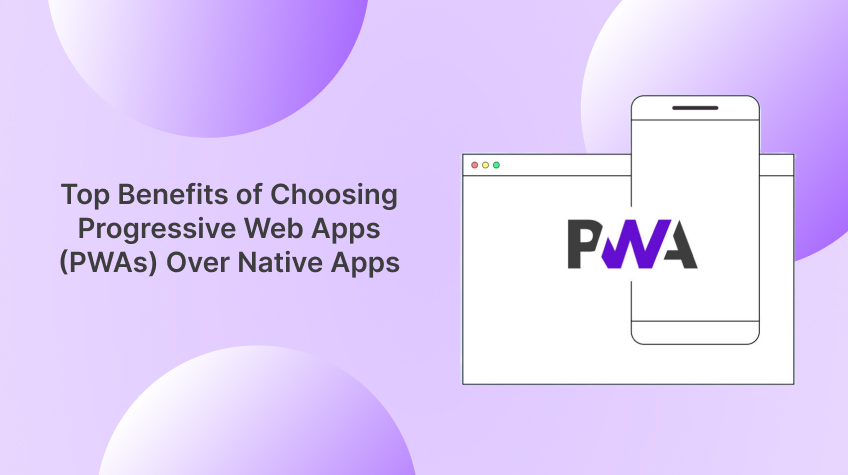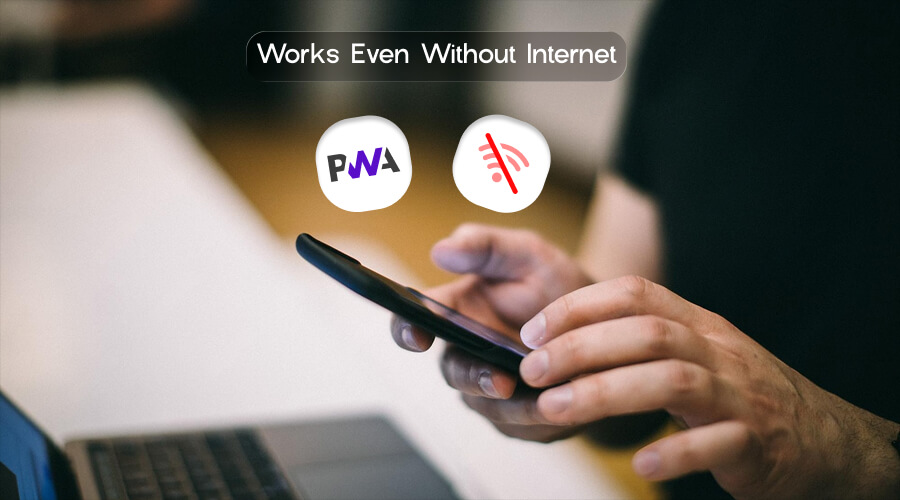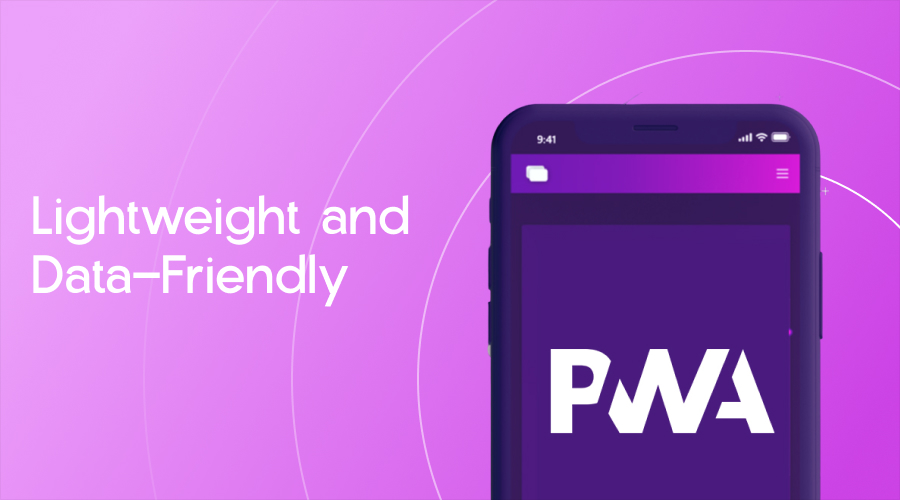
Progressive Web Applications (PWAs) combine the most useful elements of the web and mobile apps. They are opened in a browser but look, feel and act like actual applications. To businesses, this means rapid development, reduced expenses and an easier experience for users. With the increasing number of users going online via mobile devices, PWAs are emerging as one of the most intelligent means to target as many users as possible without the inconvenience of having to maintain two different Android and iOS applications.
One of the key benefits of PWAs is how they are transforming the way individuals use the internet.. They transfer the power of apps into the browser, so users can enjoy high-speed, reliable, and compelling features without going to an app store. In simple terms, a Progressive Web Applications looks like an application but operates on a webpage.
For businesses, this will mean they can create only once and connect with everyone. A PWA is self-adapted regardless of whether the user is on a phone, tablet, or computer. It is a massive benefit over creating alternative versions for Android and iOS, which can be expensive and time-intensive.
The most favorable thing is that it is user-friendly. You can open a PWA immediately with a link, and can add it to your home screen at your discretion, and receive updates automatically. No downloads, no waiting or storage issues. It is quick, lightweight, and easy to use, which is why PWAs are becoming an increasingly popular option among brands and developers around the world.
Key Benefits of Choosing Progressive Web Apps (PWAs) Over Native Apps
1. One App for All Devices
When using PWAs, companies only need to create and maintain a single version of their application, which is one of the key benefits of PWA web apps. Unlike native apps that must be coded separately for iOS and Android platforms, a PWA can be accessed from any device using a web browser. This leads to reduced development time and significantly lower long-term costs
It is also easier to update this approach. Rather than having to update a platform or even issue a new version, the changes become visible to all immediately. It is easy, hassle-free and consumes less power on the part of the development team and those who use it.
2. Lower Development and Maintenance Costs

Developing two or more native applications can be costly. Every platform has the rules of design, programming language and store policies. Under PWAs, everything developed is based on web technologies such as HTML, CSS and JavaScript, which are familiar to most developers.
Maintenance is also easier. You do not need to wait until the app stores approve and release big updates. One minor modification on the server is all that is needed to allow all users to receive the new version. This will save money and provide more time to teams to work on making features better rather than working on versions
3. Easy to Access and Share
A major benefit of the PWA is the ease of access. Users do not have to search in an app store, download and clear up their phone. They are just able to open a link and begin using the app in real-time.
This ease of use will encourage more people to use the application. In addition, PWAs can be shared similarly to any other webpage link: via text, email, or social media. It is far easier to bring new users to the business and make new customers discover it through word of mouth.
4. Lightning-Fast Performance
PWAs load fast and even over slow connections. They have a technology known as service workers that saves sections of the app to be used offline and enhances the speed of loading. When opened, a PWA would load instantly the next time, which provided users with the smooth experience of an application.
There is more than just convenience in fast loading times. Research indicates that faster loading apps increase the duration of user stay on the site and the level of interaction, as well as a higher likelihood of making a purchase or getting a job done. That is a major success for any business.
5. Works Even Without Internet

Have you ever lost internet connection when using an app and were not able to continue? PWAs solve this problem. They are still able to operate even after the internet has gone down, allowing users to read articles, access saved data, or perform offline activities. When the connection is restored, the app will automatically update.
This is a very handy offline feature that is particularly useful in places with poor networks or while travelling. It guarantees that your application is reliable, regardless of where and when it is used.
6. App-Like Feel with Home Screen Access
Even though PWAs are compatible with a browser, they appear and behave like native applications. They can be added to the home screen by a user, launched in full-screen mode, and even receive notifications. It is just a tap away once added, just like any other apps on the device. This assists companies in retaining users.
A PWA on the home screen has a greater chance of being used consistently, making it a powerful way to create long-term loyalty.
7. No App Store Barriers
App stores may be time-consuming and even limiting. Developers must adhere to rigid regulations, stand by until they are approved and share revenue or fees. All those barriers are eliminated by PWAs. Users are allowed to test them immediately, and developers can also release updates in real-time without delays in approval.
This close relation between the business and user also implies quicker feature releases, easier testing, and quicker feedback. This flexibility is invaluable to startups or firms that operate at a rapid pace.
8. Lightweight and Data-Friendly

In comparison to native apps, PWAs occupy a very small amount of storage space. Most of the content is dynamically loaded, and the user therefore does not have to download massive files or updates. This is particularly very useful to users who have low phone storage or data plans.
It is also useful to users in developing regions or rural areas where the internet is slower. PWAs are lightweight and efficient with data, thus making digital experiences more inclusive and accessible to all people.
9. Secure by Default
PWAs are provided on top of HTTPS, which keeps the information exchanged between the user and the server private and secure. This helps in safeguarding the user against normal internet risks such as data theft or hacking.
Trust is created by security in the digital world. The understanding that a business application is secure helps users to interact more and provide their personal information without fear, including payment details.
10. Perfect for SEO and Visibility

PWAs are not concealed within an app store like native apps are. This means that your app will be listed in the Google search as any other site. To business, it is free and influential advertising.
This exposure enhances the probability of new users being attracted via search and organic discovery. It can create a powerful online presence with the support of fast loading and smooth performance, increasing the number of conversions.
Tips to Get the Best Out of Your PWA
Concentration on Speed: Be sure that the application loads fast and without issues.
Keep It Simple: Minimize the number of steps; users love simplicity.
Allow Offline Use: Allow people to use your app anytime and anywhere.
Promote Installation: Provide a clear add to home-screen options.
Send Relevant Notifications: Ensure only meaningful and useful notifications.
Test on Everything: Ensure the experience remains consistent across all devices.
Routine Updates: Continue to improve based on the feedback of users.
Conclusion
The PWAs are changing the way we develop and use applications. They combine the accessibility of the web, the feel of a native application and the ease of rapid updates, at a significantly reduced cost. PWAs make an incredibly feasible option to businesses desiring to engage more users, provide more refined experiences, and reduce maintenance expenses.
Although native apps are not completely replaced yet, particularly with performance-intensive applications, PWAs are an ideal match for most of the daily demands. They are simple to operate, affordable and can be used by any person with a computer or phone.






